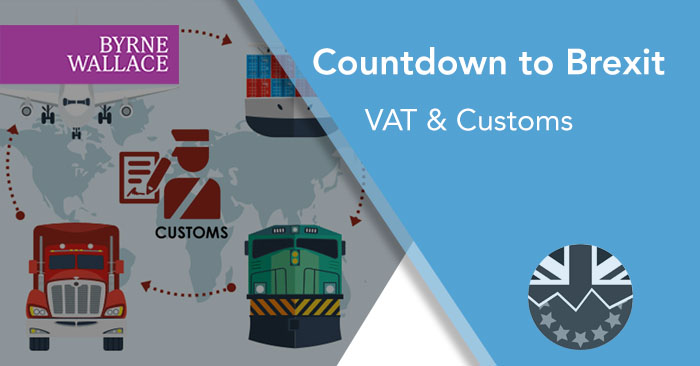Countdown to Brexit - VAT & Customs
Monday, 25 March 2019
With the Brexit deadline fast approaching, the ByrneWallace Brexit team address various issues which will impact upon businesses either trading with or through the UK, or with suppliers in the UK, and/or with UK staff based in Ireland or staff in the UK.
In the second of our spotlight series, we address VAT & Customs.
Critical issues for businesses to consider in a “No Deal" Brexit include:
Impact on the Supply Chain: Review and map the movement of goods into and out of the UK to understand the potential for disruption to supply chains caused by Brexit. Both tariff and non-tariff perspectives should be reviewed.
Product Classification: Complete a detailed Product Classification review on all affected Products. This will help determine the percentage of Customs Duty due.
Customs Duty: Customs Duty is not recoverable and is an additional cost for business. Customs Duty should apply to the import of goods into Ireland from the UK and vice versa. The applicable rate of Customs Duty needs to be clarified from a planning and budgetary perspective. The average rate of Customs Duty is currently approximately 9% (this falls to approximately 2/3% when you exclude Agri-Food products).
Customs Clearance: Whilst most of the headlines will be around Customs Duty, a non-tariff cost is the length of time and the cost of getting goods physically cleared at the relevant borders and filing of the relevant Customs declarations. Customs declarations will be required to physically move goods into Ireland from the UK and vice versa.
VAT on Importation: The “Omnibus Bill” proposes allowing for the “Postponed Accounting” for VAT on importation where businesses would no longer pay VAT at importation but account for VAT through the relevant VAT return resulting a significant cash flow saving. The Irish Revenue has confirmed that this provision will initially be open to all importers. However, it will introduce qualifying criteria to avail of this provision over time. Should a business not meet the criteria, VAT at the standard rate (currently 23% Ireland) should apply to the importation of most goods. Whilst this VAT should be recoverable in the majority of cases, businesses will need to quantify the cash flow impact of having to pay and fund import VAT in the period before they can recover same through the relevant VAT return.
VAT and Customs Relief: Consider whether any reliefs can be availed of which can delay or reduce the VAT and Customs impact. Such reliefs include on the VAT side: e.g. ensuring your business meets the criteria for “Postponed Accounting” or the use of a “VAT Deferment account” and on the Customs side: availing of e.g. “Inward & Outward Processing Relief”, Bonded Warehousing, AEO authorisation etc.
Contracts: Commercially all contracts need to be reviewed to understand and quantify the impact a “No Deal” Brexit could have and also which party will be responsible for Customs clearance, payment of VAT/Customs Duty etc.
ERP System Impact: Businesses should assess what changes will be required to their ERP/financial systems, the length of time it will take to make these changes and the cost of same to take account of VAT and Customs Duty requirements in the face of a “No Deal” scenario.
For more information on the above or for general advice on this topic, please contact a member of our Tax Team or our Brexit Team.
To register for ByrneWallace updates click here, and follow us on LinkedIn.

